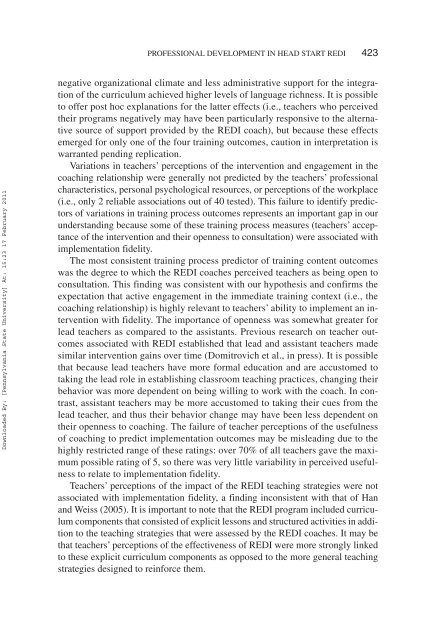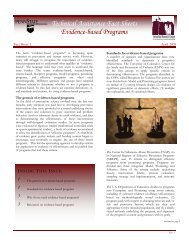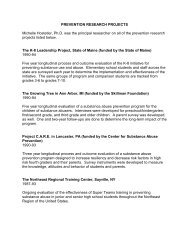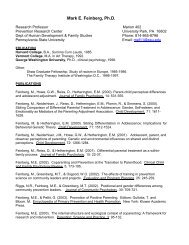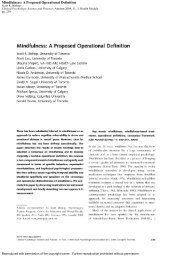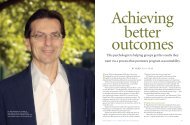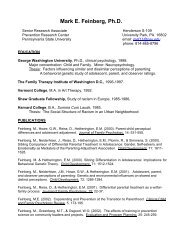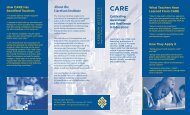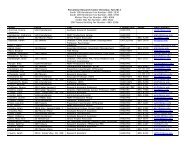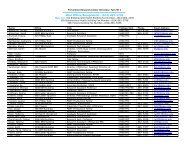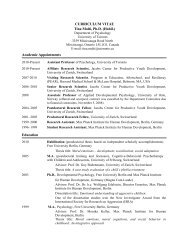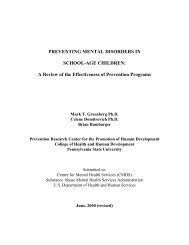Early Education & Development Individual Factors Associated With ...
Early Education & Development Individual Factors Associated With ...
Early Education & Development Individual Factors Associated With ...
Create successful ePaper yourself
Turn your PDF publications into a flip-book with our unique Google optimized e-Paper software.
PROFESSIONAL DEVELOPMENT IN HEAD START REDI 423<br />
Downloaded By: [Pennsylvania State University] At: 15:23 17 February 2011<br />
negative organizational climate and less administrative support for the integration<br />
of the curriculum achieved higher levels of language richness. It is possible<br />
to offer post hoc explanations for the latter effects (i.e., teachers who perceived<br />
their programs negatively may have been particularly responsive to the alternative<br />
source of support provided by the REDI coach), but because these effects<br />
emerged for only one of the four training outcomes, caution in interpretation is<br />
warranted pending replication.<br />
Variations in teachers’ perceptions of the intervention and engagement in the<br />
coaching relationship were generally not predicted by the teachers’ professional<br />
characteristics, personal psychological resources, or perceptions of the workplace<br />
(i.e., only 2 reliable associations out of 40 tested). This failure to identify predictors<br />
of variations in training process outcomes represents an important gap in our<br />
understanding because some of these training process measures (teachers’ acceptance<br />
of the intervention and their openness to consultation) were associated with<br />
implementation fidelity.<br />
The most consistent training process predictor of training content outcomes<br />
was the degree to which the REDI coaches perceived teachers as being open to<br />
consultation. This finding was consistent with our hypothesis and confirms the<br />
expectation that active engagement in the immediate training context (i.e., the<br />
coaching relationship) is highly relevant to teachers’ ability to implement an intervention<br />
with fidelity. The importance of openness was somewhat greater for<br />
lead teachers as compared to the assistants. Previous research on teacher outcomes<br />
associated with REDI established that lead and assistant teachers made<br />
similar intervention gains over time (Domitrovich et al., in press). It is possible<br />
that because lead teachers have more formal education and are accustomed to<br />
taking the lead role in establishing classroom teaching practices, changing their<br />
behavior was more dependent on being willing to work with the coach. In contrast,<br />
assistant teachers may be more accustomed to taking their cues from the<br />
lead teacher, and thus their behavior change may have been less dependent on<br />
their openness to coaching. The failure of teacher perceptions of the usefulness<br />
of coaching to predict implementation outcomes may be misleading due to the<br />
highly restricted range of these ratings: over 70% of all teachers gave the maximum<br />
possible rating of 5, so there was very little variability in perceived usefulness<br />
to relate to implementation fidelity.<br />
Teachers’ perceptions of the impact of the REDI teaching strategies were not<br />
associated with implementation fidelity, a finding inconsistent with that of Han<br />
and Weiss (2005). It is important to note that the REDI program included curriculum<br />
components that consisted of explicit lessons and structured activities in addition<br />
to the teaching strategies that were assessed by the REDI coaches. It may be<br />
that teachers’ perceptions of the effectiveness of REDI were more strongly linked<br />
to these explicit curriculum components as opposed to the more general teaching<br />
strategies designed to reinforce them.


